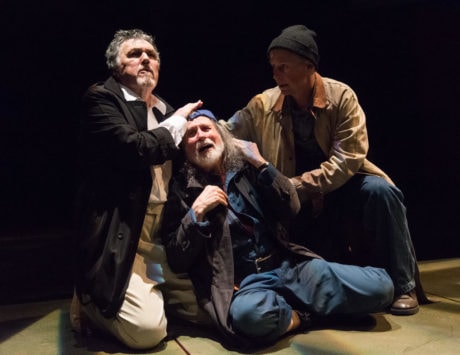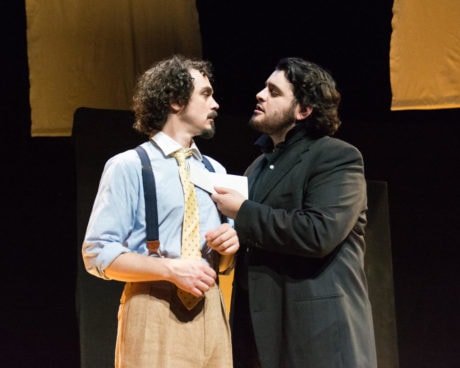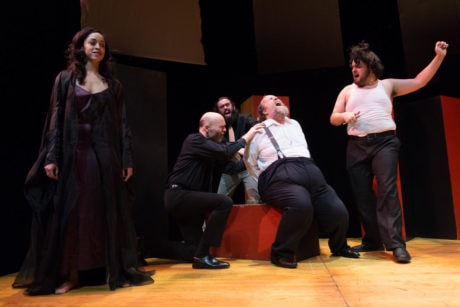On the night of the J20 Art Strike, a protest movement asking that “business . . . not proceed as usual in any realm” of the creative arts on Inauguration Day, I felt a little guilty attending a play. That said, if any such endeavor was apt, this “politically resonant story of an arrogant business mogul, a country split into warring factions, and a privileged family in turmoil”—staged by a company, Lumina Studio Theatre, serendipitously celebrating its 20th anniversary—was, arguably, it.

“Sit back. Relax. And enjoy the show.” The jovially welcoming male voice that has just apprised us of the rules of the theater regarding cell phones, restrooms and emergency exits now seems to have become, with this friendly expression of common phrases, so slick and smooth, it’s almost . . . oily. We settle a little uncertainly into our seats. Perhaps because we know that Shakespeare’s Lear is the “show” that will follow, it is hard to know whether to laugh—or to shiver. Do not fear; you will not be wrong, whichever you choose. In Lumina’s visceral LEAR, you will surely do both.
We enter to a musical medley, variegated not only stylistically, but instrumentally: show tunes and classics, pop and rock, played in their turn by bagpipes, organ, accordion, strings, and winds (Music Director: Wendy Lanxner). The stage is bare, save for a faded wooden desk chair—barely visible, perhaps in reverse personification—that sits centered at the back. Four giant video screens hang across the back of the stage, alternating words, images and film to suit (or challenge, or ignore) the action of the play (Video and Sound Engineer: Ron Murphy; Video Archivist: Kit Reiner; videographer: Ron Israel; Set Design and Build: Jim Porter). They will distract and instruct, amuse and confuse. Miss them, or even heed them, at your peril: they will untangle as often as they further muddle the complexities of the play. Which sometimes—in a work in which good and evil are so unmistakably clear, yet so clearly, devastatingly, heartbreakingly mistaken—may be their point.
As the scene opens, the seeming starkness of the deserted, unlit set is immediately rendered moot. The emptiest of elevator music, in the form of canned game-show tunes, introduces us to a boisterous costume party filled with “beautiful people”: wealthy, insouciant and smug, colorfully and eclectically garbed in everything from elegant Jovani and in-your-face Armani to conspicuous or unconscious grunge (costumes: Dianne Dumais and Raina Greifer). This, we realize, is not the 8th century B.C. of Shakespeare’s play, but the 1980s of director David Minton’s fertile imagination.
A gray-bearded Lear (John O’Connor) enters in a mask, which he rips off, laughing, his purple-vested black suit with large lapels and wide tails perhaps tellingly (or at least, suggestively) more suited to a magician than to a monarch (costumes: Dianne Dumais and Raina Greifer). The game-show paradigm resumes with a quick blare of horns, its superficiality a sign that when Lear, who is dividing up his kingdom, announces what each daughter will get, it will not reflect the requisite care and thought attendant upon such a momentous act and duty. As Lear, O’Connor is the only actor to affect a British accent (because he is British!). He is a heart-rending Lear.
We next meet the tall, blonde Goneril (Kelly O’Connor), in a fiery red, strapless floor-length gown, and the tiny (but equally lethal), raven-haired Regan (Andrea Weeks), in a sexy, come-hither red Supergirl miniskirt and thigh-high black lace-up boots (and, at the outset, a vibrant peacock-blue wig, thick, short and shimmering).

The two form a strong visual contrast to the less intently attired Cordelia (Molly Hickman), her costume most notable for the blue tights and the large, wing-like, bright blue “tail” extending from each side at the waist. Minton’s keen directorial concept of fatherly cruelty and sisterly rivalry extends here to the physical: In response to Cordelia’s inability to “heave/My heart into my mouth” and tell her father how much she loves him, the king takes an entire cake, rich with frosting, and smashes it into her face; whereupon O’Connor’s malicious (and deliciously played) Goneril, seeing a chunk left on the plate, stabs it with a fork and, with a spiteful laugh, inserts into her own mouth.
While Goneril and Regan may be united in iniquity, their husbands are less so. Regan’s, the Duke of Cornwall, is as ice-blooded as his wife: Jordan Friend, in a rich turquoise suit jacket, his voice rising to a terrifying roar as he describes what he has in store for Gloucester, takes visceral pleasure in the gouging out of Gloucester’s eyes. (It will, however, be short-lived, thanks to a servant’s timely initiative.) This harrowing scene is delivered with ear-splitting as well as visual verisimilitude, a testament to the excellence of the sound engineering, as well as to that of the actors.
Goneril’s husband, the Duke of Albany, is increasingly uneasy as the implementation of the plotters’ ultimate goal—the murder of Lear—draws near. As Albany, Brad Sperber is a man of principle; watching the growing alarm on his face, the anguish in his eyes, I realized it must bespeak an intelligence and a compassion so tragically lacking in his wife.
As the Earl of Kent, Lear’s loyal and honest friend—two attributes that are in notably short supply in the court—and a character called by Coleridge “perhaps, the nearest to perfect goodness in all Shakespeare’s characters,” Ritchie Porter exudes that rare quality, infusing his words, and through them, both vocally and gesturally, his personage, with a quiet nobility and generosity of spirit so lacking in most of his associates and “betters.” As the common man Caius, a guise assumed by Kent so as to remain close to and look after the king who has unjustly banished him, but whom he still loves, Porter gently and humorously shepherds his now confused charge, himself now suffering under a form of banishment, having been mocked and kicked out by his elder daughters.
In the role of Lear’s youngest, Molly Hickman’s general impassiveness may have been interpretive; Cordelia, though defined by her goodness, is also one of the Bard’s most cryptic characters. Still, Cordelia’s enduring kindness and forgiveness in the face of relentless evil and depravity, her almost incomprehensible, near-ethereal ability to forgive, did not strike the chord of admiration, awe and sympathy it often does. So that, while admiring Hickman’s military bearing, stern resolve and surprising (and satisfying) acrobatic and swordplay ability in a marvelous turn (and Dumais’s and Greifer’s stylish and commanding black-and-gray, spit-and-polish uniform) as Cordelia leads her French troops in Act 4, it was, for this reviewer, difficult to see an emotional through-line to it from her quiet and accepting frankness in Act 1.
And then there is the king’s friend Gloucester, whose two sons are as much opposites as Lear’s first two daughters are, for all intents and purposes, a pair. As the evil Edmund, Gloucester’s younger, illegitimate son, whose resentment of his state leads him to join in league with Goneril and Regan, Ian Blackwell Rogers offers a Snidely Whiplash malevolence combined with a balletic grace, as light, quick, and sure on his feet as he is in his plots. Yet his anger, outsized as it is, is not baseless; as villainies go, Edmund’s is not without cause, and Rogers’s portrayal skillfully milks an audience’s ambivalence.
As Gloucester, who is as blind to his younger son’s calculated, seething fury as he will become, quite literally, to the world around him, Brian Monsell, his large frame reveling in a festival of color—bright orange jacket, brown pants, tie of orange, blue and brown, all serving as a sort of sartorial dramatization of his childlike innocence—displays a gullibility not unlike his elder son’s. As Gloucester accepts Edmund’s lies, so Edgar (Keith Anderson) swallows them whole, much like a puppy dog who believes that everyone is good at heart, or will realize the error of their ways and become his friend.
But Edgar is more than a puppy. In fact, he is one of the most multifarious characters in all of Shakespeare, and Anderson plays him—and them—to the hilt. In a series of lickety-split impersonations, Edgar narrates and acts out the numerous transformations he will undergo as he tries to save himself from his brother’s, and now, deluded father’s machinations, and avenge his father. One thing the two sons do have in common, at least on stage: Roger’s Edgar is also astonishingly agile and energetic in word and action, his breakneck verbal hilarity and physical dexterity effectively and simultaneously complementing and competing with each other.

On the other side of the age spectrum, Lear’s Fool (Robert Wiser, in faded jeans, with a backward baseball cap slanted across his wispy white locks), merry tho he may be, evinces, rather than hilarity, a ’60’s vibe that complements his liege’s incipient insanity, bearing his blows and arbitrary reproofs and responding with slightly warped wit and wisdom. Ably warbling, on-key and off, the storied songs of protest and peace to which these empty, grasping ‘80’s denizens are deaf, adding and editing lyrics to soothe or amuse his king, Wiser presents a Fool who is both remnant and sad reminder of a more innocent time.
Technically, this show is superb in all respects. The brilliant, blinding lightning flashes (lighting design: Dylan Uremovich) and Ron Murphy’s crashing, spine-chilling thunder produce a terrifying, electrifying storm on the heath, while the intensity of the sword fights between Edgar and Edmund (and of Anderson and Sperber as they enact them) is so fierce, their heavy, gleaming blades thrust with such determined, single-minded malice, one dares not turn his or her eyes away for even a split second for fear of missing a decisive lunge or pivot, a key retreat or fade (Fight Choreographer: Jonathan E. Rubin; props: Jeff Struewing).
The supporting actors, too, are excellent, each of them (Mar Reiner, Mark Jefferson, Liz Porter, Andy Penn, Cassie Gabriel, Lilac Gordon, and Ian Fore) playing anywhere from two to five roles, their representationsk aided by Dumais’s and Greifer’s costumes.

Running Time: 2 hours and 50 minutes, including an intermission.
LEAR plays through January 28, 2017, at Lumina Theatre and Studio performing at The Silver Spring Black Box Theatre – 8641 Colesville Road in Silver Spring, MD. For tickets, purchase them online.




